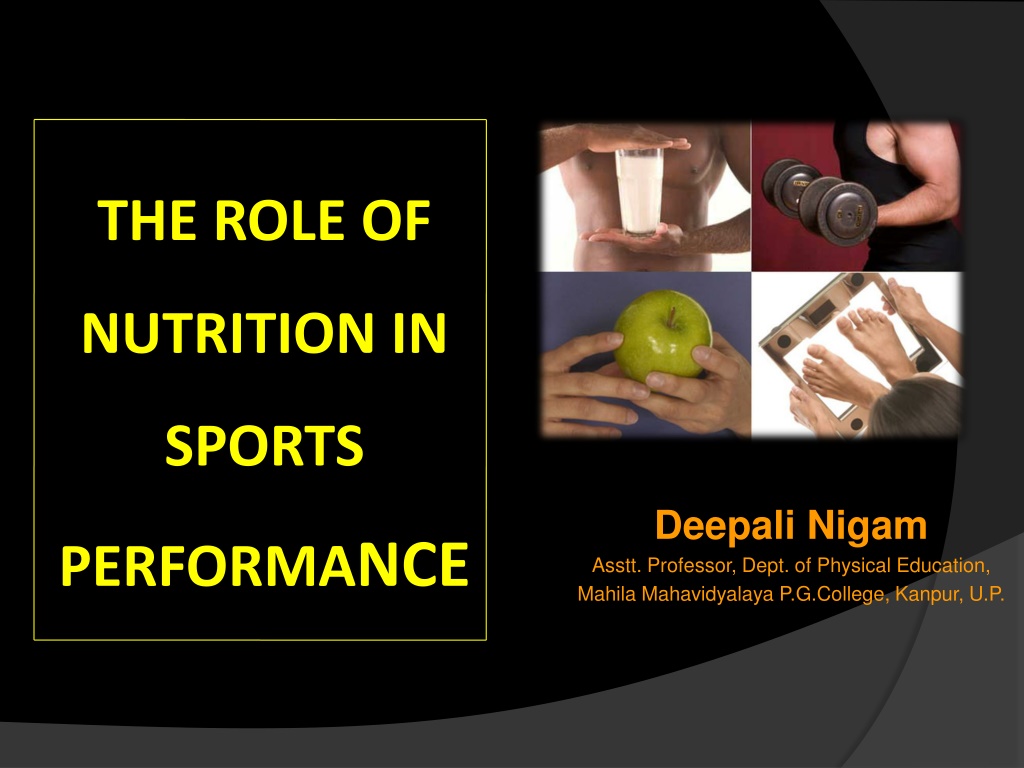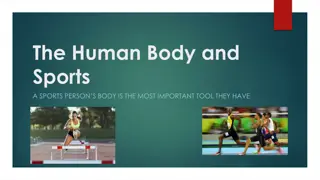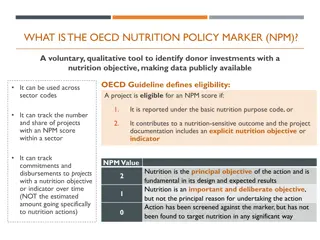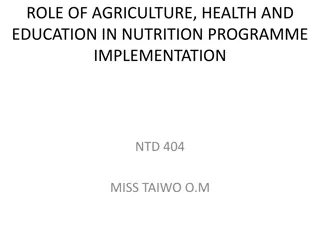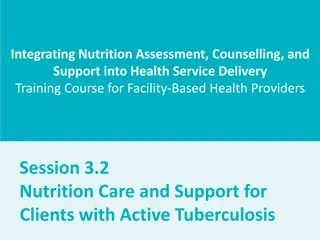The Role of Nutrition in Sports Performance
Nutrition plays a vital role in sports performance by providing energy, aiding muscle recovery, and supporting overall health. Athletes benefit from proper nutrient balance, including carbohydrates, proteins, fats, vitamins, minerals, fluids, and calories, to optimize their performance and achieve success in competition. Sports nutrition serves various purposes such as preparing athletes, maintaining performance levels, aiding recovery, and preventing eating disorders or supplement abuse.
Uploaded on Oct 06, 2024 | 0 Views
Download Presentation

Please find below an Image/Link to download the presentation.
The content on the website is provided AS IS for your information and personal use only. It may not be sold, licensed, or shared on other websites without obtaining consent from the author. Download presentation by click this link. If you encounter any issues during the download, it is possible that the publisher has removed the file from their server.
E N D
Presentation Transcript
THE ROLE OF NUTRITION IN SPORTS Deepali Nigam Asstt. Professor, Dept. of Physical Education, Mahila Mahavidyalaya P.G.College, Kanpur, U.P. PERFORMANCE
INTRODUCTION Nutrition is the science that deals and its uses by the body. The relationship between nutrition and athletic performance is as certain connection physical training athletic success. with food as between the and
Purpose of Sports Nutrition Purpose of Sports Nutrition Sports nutrition has several purposes: To prepare athletes before performance or training. To maintain an acceptable level of performance during competition or training. To help the athlete's body recover after training or athletic competition. To provide sound information about healthy dietary practices and use of supplements. To monitor athletes for signs of eating disorders, doping, supplement abuse, or other unhealthful nutritional practices. To provide specialized nutritional advice to athletes following vegetarian, vegan, or other special diets. To monitor the special nutritional needs of persons with disabilities who participate in athletic activities and programs.
NUTRIENT BALANCE NUTRIENT BALANCE Carbohydrates Protein Fats Vitamins and Minerals Fluids Calories Consumed Calories Expended
Carbohydrates Carbohydrates They provide quick energy to the body and are not stored in body for long. it enhances energy and fuels the muscle constructions in the body. it breaks down into smaller sugars such as glucose, fructose, and galactose which are absorbed by the body to release energy. Carbohydrate recommendations for athletes range from 6 to 10 g/kg body weight. The main source of carbohydrate are sugar, cereals, grains, dried fruits etc.
Protein Proteins are the basic structure of all living cells. Proteins is a chain of amino acids that contain carbon, oxygen, hydrogen and nitrogen. It is constantly being synthesized and degraded. Resulting in the maintenance of muscle and lean tissue mass. The best sources of complete proteins are eggs, milk, meat, poultry, beef and milk products. Protein recommendations for endurance and strength-trained athletes range from 1.2 to 1.7 g/kg body weight.
Fat Fat also contain carbon, hydrogen and oxygen. They are most source of energy in foods. concentrated Fat provides energy, protects the body's organs and helps with the absorption of some vitamins. Good choices include the fats from nuts, seeds, vegetable oils (canola, olive, peanut), and avocados. Fat intake should range from 20% to 35% of total energy intake.
Vitamins and Minerals Vitamins and Minerals These are also called MICRONUTRIENTS which plays a vital role in energy production, hemoglobin synthesis, maintenance of bone health, immune function and protection oxidative damage. adequate of body The vitamins and minerals found to be of concern in athletes' diets are calcium and vitamin D, the B vitamins, iron, zinc, magnesium. most common
Fluids Water makes up about 60 percent of a person's body weight. Water helps move nutrients throughout the body and helps remove waste from the body. It is preventing from dehydration and avoiding injury. Even mild dehydration can cause muscle and body fatigue, which will reduce athletic performance. Dehydration increases the risk of potentially life-threatening heat injury such as heat stroke.
Fluid intake guidelines Fluid intake guidelines WHEN TO DRINK AMOUNT OF FLUID 2 hr before exercise 2-3+ cups 15 minutes before 1-2+ cups Every 15 minutes DURING 1-1.5 cups After 1 hour of Activity Drink Freely
The Timing of Meals The Timing of Meals The importance of what foods are eaten is matched only by when they are eaten. 1. Several Hours before You Workout Thirty Minutes before You Workout 2. During Your Workout 3. Hydration after Your Workout 4. Eating After Your Workout 5.
Several Hours before You Several Hours before You Workout Workout Depending upon your exercise style. Include easily digestible foods Experiment with what works best for you
Thirty Minutes before You Workout Thirty Minutes before You Workout Depending upon the type and duration of workout Hard work out Shorter workout Drink 6-12 ounces in the hour before your workout.
During Workout During Workout Proper hydration during exercise depends upon the intensity and duration of exercise, the fitness of the athlete, and weather conditions. Exercising for more than about 90 minutes usually requires that you replenish lost carbohydrates. If your workout is less than an hour, then you don't need to consume anything extra.
Hydration after Workout Hydration after Workout After your workout, drink enough water to replace water lost through sweat. The best way to determine this is by weighing yourself before and after exercise. Another way to determine how much liquid to consume is to check the color of your urine.
Eating After Workout Eating After Workout The post-exercise meal should be eaten within two hours of a long or intense workout in order to replenish glycogen stores for continued exercise. Studies have found that a 4:1 ratio of carbohydrate to protein seems to the ideal combination of nutrition. Solid foods can work just as well as a sports drink, a drink may be easier to digest make it easier to get the right ratio and meet the 2- hour window.
